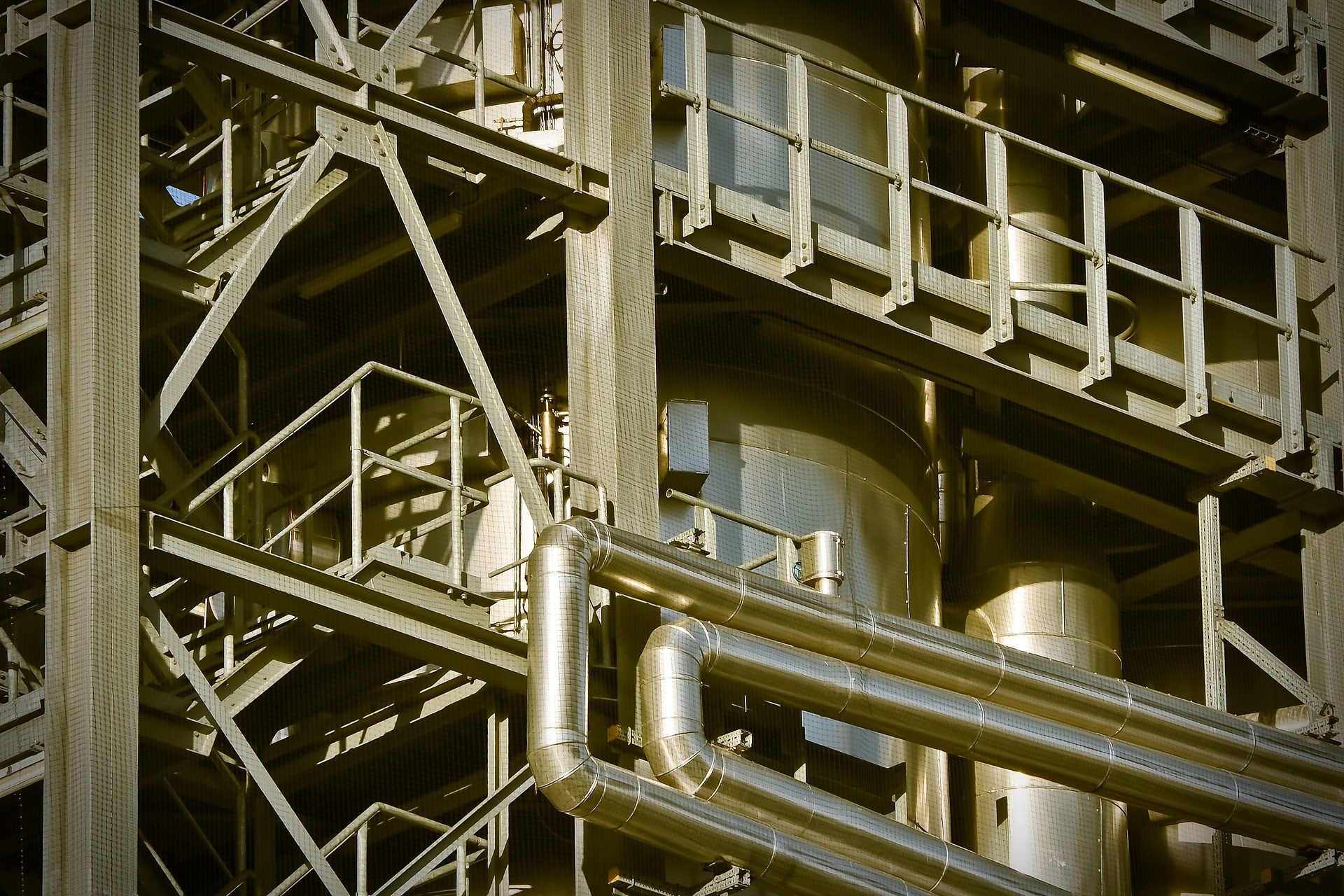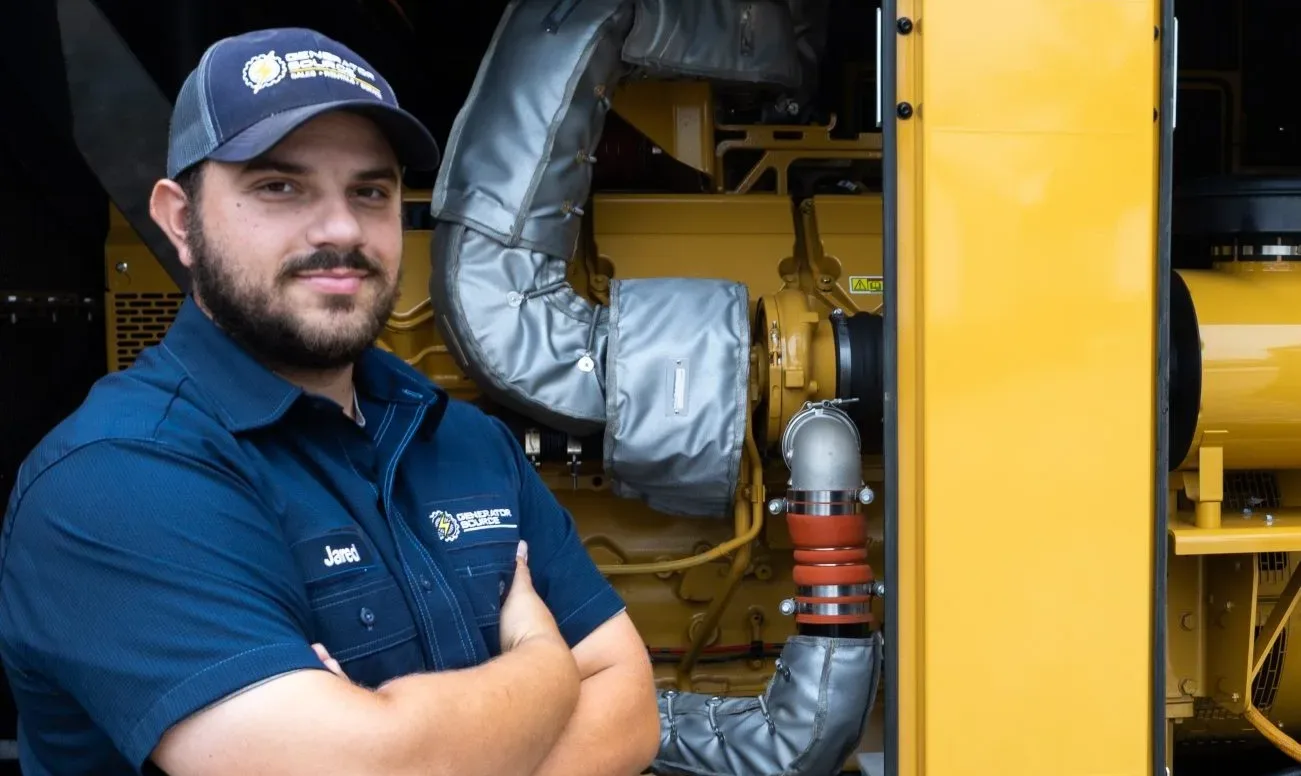
Powering Industries for 50+ Years
The Ultimate Guide to Commercial & Industrial Generators
Generator Sales, Service, & Rentals
An Expert Resource for Choosing Your Power Solution
Choosing a commercial or industrial generator is a significant investment in your facility’s resilience and operational continuity. The decision goes far beyond simply picking a kilowatt (kW) rating; it involves understanding fuel types, specific application demands, major brands, and the true total cost of ownership. This guide is designed to serve as an expert resource, answering the most common questions and providing the insights you need to select the right power solution for your business. We will cover the key topics business owners, facility managers, and engineers search for when they need reliable power.
What is a Commercial Generator?
At its core, a commercial or industrial generator is a self-contained system that provides electrical power in the event of a utility outage or in a location where grid power is unavailable. Unlike smaller residential or portable units, these generators are engineered for high-demand applications, built for durability, and designed to power entire facilities, from manufacturing plants and data centers to hospitals and large retail operations. They are defined by their robust engine construction, higher power output (typically ranging from 50kW to over 4,000kW), and advanced control systems that allow for seamless integration with a building’s electrical infrastructure.
Types of Generators
Diesel Generators
Diesel generators are the long-standing workhorses of the backup power industry, prized for their unmatched reliability, durability, and fast response time. For mission-critical facilities where failure is not an option, diesel remains the gold standard.
- Key Advantages: Diesel engines are incredibly robust and have a longer operational lifespan than their gaseous counterparts. They are more fuel-efficient under high loads, meaning they consume less fuel to produce the same amount of power. The most significant advantage is the ability to have a secure, on-site fuel supply in a dedicated tank. This provides true independence from utility lines, which is a mandatory requirement for life-safety applications like hospitals under NFPA 110.
- Considerations: Modern diesel generators are subject to strict emissions regulations set by the Environmental Protection Agency (EPA), known as Tier standards. Additionally, on-site fuel requires management, including regular testing and treatment to prevent degradation. For engines that run infrequently or under light loads, a condition known as “wet stacking” can occur, requiring periodic load bank testing to maintain engine health.
Natural Gas Generators
Natural gas generators have become an increasingly popular choice for a wide range of commercial applications, largely due to their lower emissions profile and the convenience of a continuous fuel supply from a utility pipeline.
- Key Advantages: Natural gas is a cleaner-burning fuel, resulting in significantly lower emissions of nitrogen oxides (NOx) and particulate matter. This can simplify the air permitting process in many regions. The direct connection to a utility gas line eliminates the need for large on-site fuel storage tanks and the associated management costs. For facilities with a reliable natural gas infrastructure, this can lead to lower operational costs.
- Considerations: The primary drawback is the dependence on the utility gas line. In the event of a major natural disaster, like an earthquake or hurricane that could compromise gas lines, the generator would be inoperable. This makes natural gas unsuitable for many mission-critical facilities that require absolute power independence.
Key Commercial Generator Applications
Healthcare & Data Centers
These mission-critical facilities demand 100% uptime and are governed by strict codes like NFPA 110. This makes diesel generators with on-site fuel storage the mandatory standard. Key features include N+1 or 2N redundancy, advanced paralleling switchgear to run multiple units in sync, and sophisticated monitoring systems.

Manufacturing & Industrial Plants
Powering heavy machinery, motors, and production lines requires generators with excellent transient response, the ability to handle the massive surge in demand from large motor starts without faltering. Both diesel and natural gas can be suitable, depending on whether the primary need is for emergency standby or continuous prime power.

Construction & Agriculture
These applications often take place in remote, rugged environments far from the grid. Durable, trailer-mounted portable diesel generators are the go-to solution. Critical features include sound-attenuated enclosures to manage noise, robust trailer designs, and large, integrated fuel tanks for extended run times.

Commercial Buildings, Hospitality & Retail
The primary need is for reliable standby power to keep life-safety systems (emergency lighting, fire pumps), HVAC, refrigeration, and point-of-sale systems online during an outage. Natural gas is a very popular and convenient choice for these applications due to its clean operation and lack of on-site fuel storage.

Major Power Players
Caterpillar (CAT)
Known globally for their legendary durability and robust mechanical engines. CAT generators are a top choice for the most demanding and harshest applications, including mining, marine, oil & gas, and mission-critical facilities.
Cummins
A leader in advanced engine technology and sophisticated digital controls. Cummins generators are prized for their fuel efficiency, industry-leading paralleling capabilities, and one of the largest and most respected sales and service networks in the world.
Kohler/Rehlko
A powerhouse in critical power solutions, especially for the healthcare and data center markets. Kohler is known for its high-performance alternators, exceptional motor-starting capabilities, and fully integrated power system designs, from the generator to the transfer switch.
MTU
A premium brand specializing in high-horsepower diesel engines for large-scale and critical power applications. MTU is synonymous with cutting-edge engineering and performance for facilities that require the utmost in power density and reliability.
Generac
A major player in the power generation market, Generac offers a wide range of products. While widely known for residential units, their commercial and industrial lines provide powerful and cost-effective solutions for a variety of business applications.
Hipower
A leading manufacturer of diesel and natural gas power solutions, known for their highly durable and customizable enclosures. They are a strong choice for rental, mobile, and demanding applications requiring robust and easily transportable power.
Understanding the True Cost of a Commercial Generator
Answering “how much does a commercial generator cost?” is complex because the initial purchase price is only one part of the equation. The Total Cost of Ownership (TCO) is a more accurate measure, and it’s influenced by far more than just the kilowatt rating. A proper sizing calculation performed by a qualified engineer is the essential first step to getting an accurate price.
Key Factors Influencing Price:
- Capacity (kW): This is the primary driver. A 200kW generator will have a significantly different price point than a 2000kW unit.
- Enclosure: A standard weather-protective enclosure is the baseline. A sound-attenuated or walk-in enclosure, designed to reduce noise levels, can add tens of thousands of dollars to the cost.
- Automatic Transfer Switch (ATS): The ATS is a critical but separate component that automatically transfers the electrical load. Its cost varies based on the amperage rating and features like closed-transition for sensitive electronics.
- New vs. Used: A high-quality, low-hour used generator from a reputable dealer can offer significant savings (30-50%) compared to a new unit, providing excellent value and faster availability.
- Installation: Remember to budget for the “soft costs” of installation, which can be substantial. This includes delivery freight, crane services for rigging, electrical work to connect the ATS, and fuel line connection.
Your Nationwide Partner with Local Expertise
Choosing the right power partner is as important as choosing the right generator. From our headquarters in Brighton, Colorado, Generator Source serves a diverse range of clients across the entire United States. Our expertise isn’t just national; it’s local. We understand the unique environmental and regulatory challenges that businesses face in different regions, whether it’s navigating the stringent air quality regulations in California, engineering hurricane-rated solutions for Florida, providing reliable power for the Texas energy sector, or addressing the high-altitude demands of the Rocky Mountains. Our team has the hands-on experience to deliver compliant, reliable power solutions tailored to your specific location.
Frequently Asked Questions (FAQ)
How do I determine the right size generator for my business? A professional load calculation is essential. A qualified engineer will analyze your facility’s electrical loads, including the starting requirements of your largest motors, to determine the precise kilowatt (kW) capacity you need. Oversizing is inefficient, while undersizing can lead to generator failure.
What is the difference between standby, prime, and continuous power? Standby generators are for emergency backup during a utility outage. Prime power generators are designed to be the primary power source for a facility, often in remote locations, and can run for extended periods. Continuous power generators are engineered to run 24/7 at a consistent load with no variation.
What maintenance does a commercial generator require? Regular preventative maintenance is critical. This includes weekly visual inspections, monthly no-load tests, and an annual service that includes changing oil, filters, and coolant. For diesel units, an annual load bank test is also highly recommended to ensure engine health.
Can I get a quote for a commercial generator? Absolutely. The best way to get an accurate quote is to speak with one of our power experts. We can discuss your specific application, power requirements, and budget to provide a tailored solution that includes equipment and installation considerations.
Still have questions or looking for more information?
Generator Source specializes in low-hour, used, new, and surplus generator sets. We have a wide variety of generator sizes and models to fit any project. We are not a broker, we own what we sell.
Call us today (877-866-6895) or click Contact Us to be connected with one of our experienced sales reps.
We have 350+ generators in stock and ready to ship!
